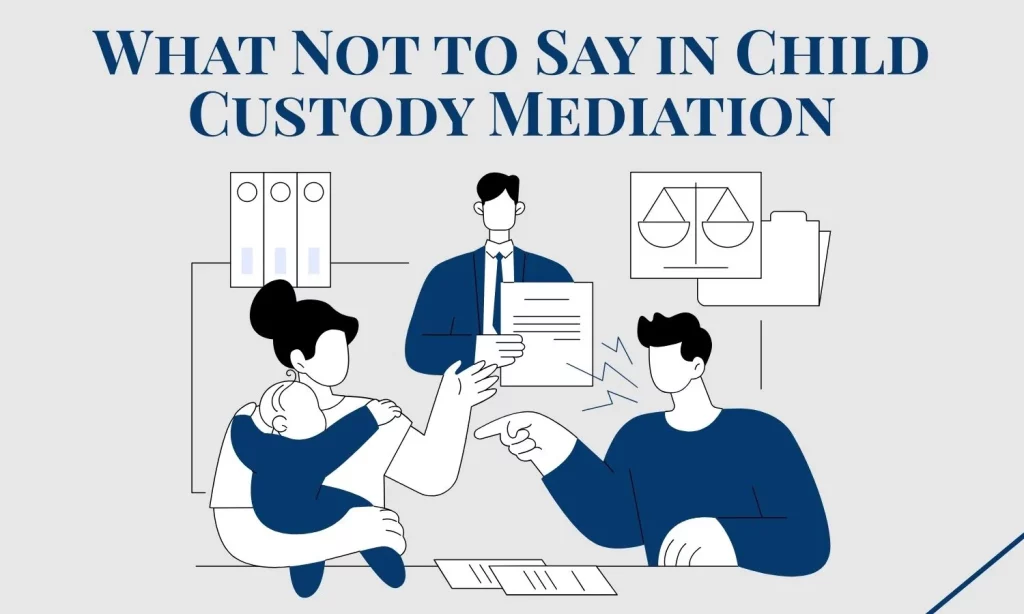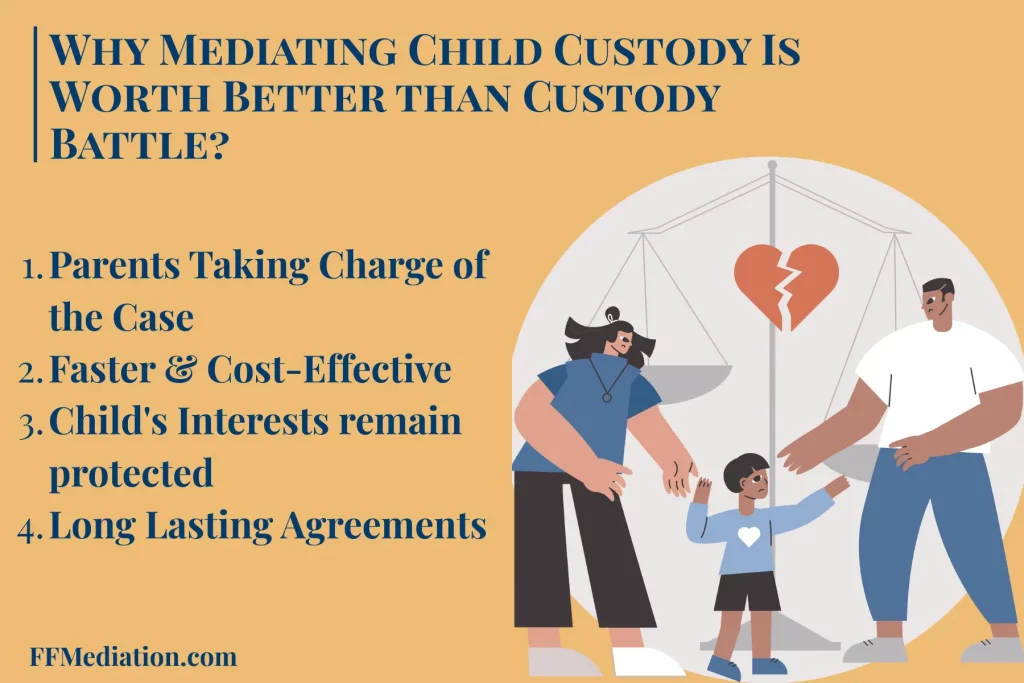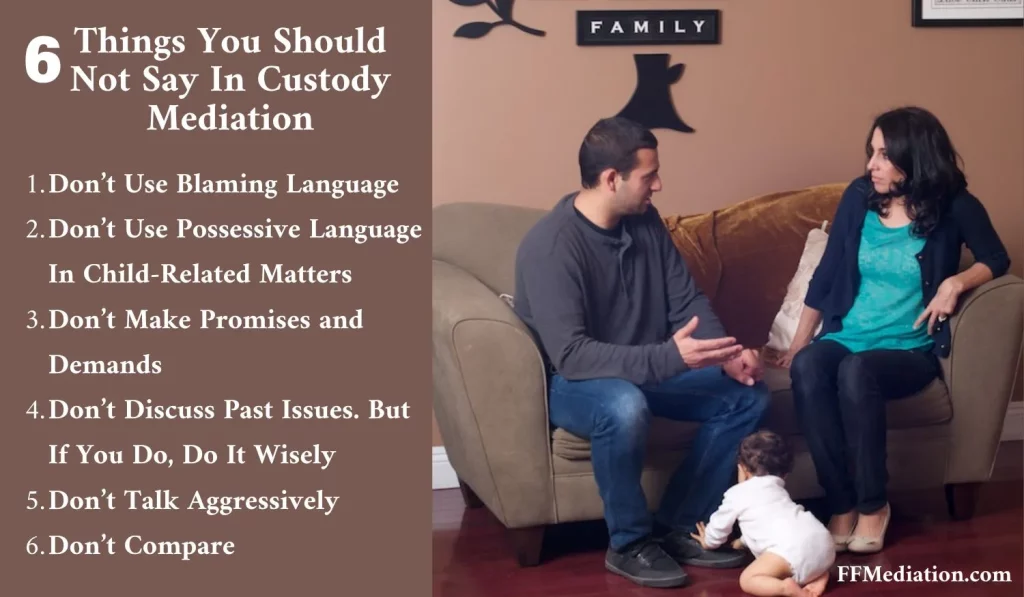
Providing Divorce Mediation Services Throughout California
Providing Divorce Mediation Services Throughout California
Home » Divorce and Family law Blog » What Not to Say in Child Custody Mediation: Avoid These 6 Common Mistakes

Child custody mediation helps parents reach an agreement effectively and amicably regarding conflicts related to the child.
It is also a required agreement in a divorce matter if the parents have minor children.
In mediation for custody, you do want to prepare your thoughts as to what custody plan might work well for your child(ren) and why. You don’t need to have the answers given, the mediator will help you think of solutions.
Remember, it’s to your and your children’s benefit to work with your spouse. But what should you not say during mediation?
Blaming, using possessive language, discussing past issues, and talking aggressively hurts your chances to successfully mediate and achieve your goals.
This article discusses 6 things that you should avoid saying during custody mediation.
Our child custody mediators have over 20+ years of experience in helping parents reach a quality custody agreement in California. Schedule your FREE Child Custody Mediation Consult today with Families First Mediation.
Dina Haddad, California’s top-rated attorney-mediator, defines child custody mediation in these words:
“Child Custody Mediation is a voluntary and confidential process in which (a neutral third-party) mediator facilitates divorcing or separating parents to reach an agreement on physical or legal custody of a child without court hearings.”
Child custody disputes may include discussing parenting responsibilities, child support, visitation schedules, travel rules, and co-parenting agreements.

The following are reasons why mediating child custody is a better option than a court custody battle.
In custody mediation, parents have more say in creating the custody agreement, unlike the court process in which the judge decides solely without taking care of the parent’s opinions.
If your co-parent is a narcissist, you need a strong mediator and unique strategies to be prepared for child custody mediation with a narcissist.
Custody mediation is faster and more cost-effective than working disputes through expensive lawyers and busy courts.
Custody mediators keep the child’s needs first in mediation. Whereas, the child’s needs in adversarial custody battles may get ignored.
Child custody mediation empowers parents to communicate well on the issues pertaining to custody, which leads to quality agreement.
Whereas, in contested cases, you can expect little to no communication, resulting in a short-lived agreement.

Custody mediation is not the right platform to express negative opinions about your spouse.
Avoid the common mistake of hurting your spouse during mediation. Staying civil and respectful helps you reach a quality agreement.
The following are the custody mediation tips to help you better understand what not to say in child custody mediation.
If you are discussing your spouse’s past mistakes in custody mediation, refrain from blaming.
Expert custody mediator Dina Haddad reports that she has seen spouses blaming each other in this way:
If you are interested in learning the “Do’s and Don’ts” of child custody mediation, click here.
If you blame, it’s more likely that your spouse will become defensive after listening to your criticism, which can escalate conflict and hostility.
You are here in custody mediation to establish an agreement that can benefit the child’s well-being.
Therefore, how you discuss issues in parenting needs to be centered on reaching an agreement or making positive changes for your children’s benefit.
That’s why act sanely and never blame or accuse your spouse.
While in custody mediation, try your best to consider the other parent in the parenting relationship.
Avoid possessive statements when you refer to your child during the discussion, such as “my child” or “my kids.” It’s incredibly hurtful to the other parent.
Rather, replace possessive pronouns (I, my, me, etc.) with phrases like ‘our kid’ or ‘our son’ to let your co-parent feel involved in the process.
Your and your child’s circumstances can change with time. Making specific promises during this decisive stage, due to pressure or expectations, can create difficulty for you when you have to fulfill them later, while frustrating and disappointing another person.
Similarly, be careful about your demands and requests while sitting in a mediation session. You cannot make demands like asking for unnecessary child support or denying access to your co-parent — without substantive proof that your child(ren) would be in harm’s way.
For example:
Do your best to position your requests reasonably. Offering suggestions and presenting concerns allows for open communication and solutions — without pushing your spouse away.
‘My way or the highway’ strategy can create tension in reaching a quality child custody mediation agreement while denying the child’s best interests and needs. It can also result in the mediation failing.
Sometimes, discussing past issues or problems is important to unfold solutions in mediation. Therefore, when you present them, do so in a manner that helps achieve the end goal: Your children’s best interests.
Consider the best manner to discuss important issues that impact your children without pushing your spouse out of the conversation.
Parenting plan mediation is a casual and informal, unlike the court’s formal and strict process. Avoid any behavior or discussion that reflects aggression towards your spouse or mediator. The following are the don’ts of behavior in custody mediation.
So, avoid the phrasing like this: “I will make you pay.” Alternatively, “I will see you in the court.”
Your and your spouse’s attitude would decide how better you end up with a quality agreement.
Making unreasonable comparisons in child custody mediation could make it go wrong. The parents need to be cooperative, which may not be possible if one parent is comparing things.
Picture this scenario where one parent in child custody mediation compares things this way. Do you think it would not drag their case to court?
And the list goes on…
Winning a child custody mediation in California requires proper strategy and knowing how to present yourself when attending mediation.
This section throws light on tips for parents to mediate child custody effectively.
Use “I” language. “I” statements? “I” statements are communication techniques for expressing your needs and feelings without blaming others or discussing other’s faults.
See these examples for a better understanding:
The following are the benefits of using “I” statements in child custody mediation:
Share any ideas you have concerning agreements, custody proposals, visitation schedules, holiday arrangements, and child support.
Discuss practical ideas keeping the child’s well-being and future in mind. The long-lasting agreement will only be possible if both parents commit to discussing the true needs of the child, such as education, daily schedules, developmental needs, emotional well-being, social activities, and medical needs.
If you have discussed your proposals and offered solutions, listen to your spouse’s point of view without interrupting him or her. Your listening does not mean that you agree with every point of your spouse, but it means that you are willing to find common ground.
If you have questions, you can ask them later.
Share any ideas you have concerning agreements, custody proposals, visitation schedules, holiday arrangements, and child support.
Discuss practical ideas keeping the child’s well-being and future in mind. The long-lasting agreement will only be possible if both parents commit to discussing the true needs of the child, such as education, daily schedules, developmental needs, emotional well-being, social activities, and medical needs.
Share practical ideas you have concerning agreements, custody proposals, visitation schedules, holiday arrangements, and child support.
This will result in long-lasting agreements that truly align with your child’s educational, daily, developmental, and emotional well-being or needs.
Want to create a long-term custody agreement at a fraction of the cost of a court custody battle? Talk to California’s Best mediator, Dina Haddad, by scheduling a FREE Child Custody Mediation Consult.
The following are the 7 things that you should never say in child custody mediation.
Child custody mediation is an easy, affordable, and peaceful process in California. If you want to make it super easy, never blame your spouse, make promises, and never discuss irrelevant past issues.
The following are the custody mediation tips for mothers and fathers who want to have a successful child custody mediation.
Related: Can you move out of state with a child and no custody agreement?
The following are the 7 don’ts of child custody mediation in California:
The following are the tips for mothers and fathers before attending child custody mediation:


Families First Mediation is a pioneer in the field of divorce mediation. Our entire divorce mediation team takes great pride in being active trainers, divorce mediators and teachers of mediation in the greater California area. If you are considering a collaborative divorce, legal seperation or looking for a san jose divorce lawyer we have services that may be beneficial to you. Take advantage of our vast expertise and background in the field of divorce mediation and our genuine desire to help with your divorce mediation services.